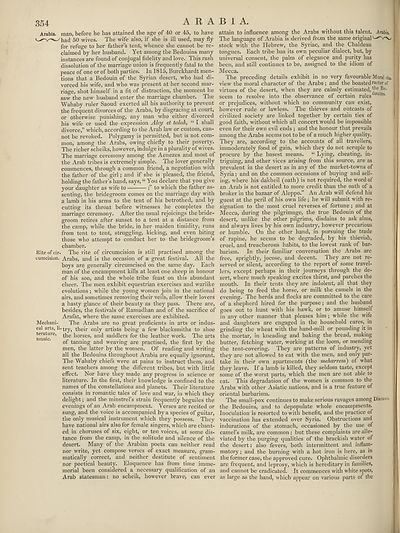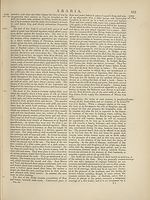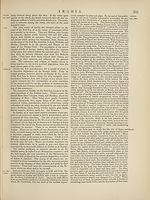Encyclopaedia Britannica > Volume 3, Anatomy-Astronomy
(362) Page 354
Download files
Complete book:
Individual page:
Thumbnail gallery: Grid view | List view

354
ARABIA.
Arabia, man, before he has attained the age of 40 or 45, to have
had 50 wives. The wife also, if she is ill used, may fly
for refuge to her father’s tent, whence she cannot be re¬
claimed by her husband. Yet among the Bedouins many
instances are found of conjugal fidelity and love. This rash
dissolution of the marriage union is frequently fatal to the
peace of one or of both parties. In 1815, Burckhardt men¬
tions that a Bedouin of the Syrian desert, who had di¬
vorced his wife, and who was present at her second mar¬
riage, shot himself in a fit of distraction, the moment he
saw the new husband enter the marriage chamber. The
Wahaby ruler Saoud exerted all his authority to prevent
the frequent divorces of the Arabs, by disgracing at court,
or otherwise punishing, any man who either divorced
his wife or used the expression Aley et talak, “ I shall
divorce,” which, according to the Arab law or custom, can¬
not be revoked. Polygamy is permitted, but is not com¬
mon, among the Arabs, owing chiefly to their poverty.
The richer scheiks, however, indulge in a plurality of wives.
The marriage ceremony among the Aenezes and most of
the Arab tribes is extremely simple. The lover generally
commences, through a common friend, a negotiation with
the father of the girl; and if she is pleased, the friend,
holding the father’s hand, says, “ You declare that you give
your daughter as wife to to which the father as¬
senting, the bridegroom comes on the marriage day with
a lamb in his arms to the tent of his betrothed, and by
cutting its throat before witnesses he completes the
marriage ceremony. After the usual rejoicings the bride¬
groom retires after sunset to a tent at a distance from
the camp, while the bride, in her maiden timidity, runs
from tent to tent, struggling, kicking, and even biting
those who attempt to conduct her to the bridegroom’s
chamber.
Riteofcir- The rite of circumcision is still practised among the
cumcision. Arabs, and is the occasion of a great festival. All the
boys are generally circumcised on the same day. Each
man of the encampment kills at least one sheep in honour
of his son, and the whole tribe feast on this abundant
cheer. The men exhibit equestrian exercises and warlike
evolutions; while the young women join in the national
airs, and sometimes removing their veils, allow their lovers
a hasty glance of their beauty as they pass. There are,
besides, the festivals of Ramadhan and of the sacrifice of
Arafat, where the same exercises are exhibited.
Mechani- The Arabs are no great proficients in arts or indus-
cal arts, li-try^ their only artists being a few blacksmiths to shoe
teiature, ]10rseS) an(j saddlers for the leather work. The arts
of tanning and weaving are practised, the first by the
men, the latter by the women. Of reading and writing
all the Bedouins throughout Arabia are equally ignorant.
The Wahaby chiefs were at pains to instruct them, and
sent teachers among the different tribes, but with little
effect. Nor have they made any progress in science or
literature. In the first, their knowledge is confined to the
names of the constellations and planets. Their literature
consists in romantic tales of love and war, in which they
delight; and the minstrel’s strain frequently beguiles the
evenings of an Arab encampment. Verses are recited or
sung, and the voice is accompanied by a species of guitar,
the only musical instrument which they possess. They
have national airs also for female singers, which are chant¬
ed in choruses of six, eight, or ten voices, at some dis¬
tance from the camp, in the solitude and silence of the
desert. Many of the Arabian poets can neither read
nor write, yet compose verses of exact measure, gram¬
matically correct, and neither destitute of sentiment
nor poetical beauty. Eloquence has from time imme¬
morial been considered a necessary qualification of an
Arab statesman: no scheik, however brave, can ever
attain to influence among the Arabs without this talent. Arabia.
The language of Arabia is derived from the same original
stock with the Hebrew, the Syriac, and the Chaldean
tongues. Each tribe has its own peculiar dialect, but, by
universal consent, the palm of elegance and purity has
been, and still continues to be, assigned to the idiom of
Mecca.
The preceding details exhibit in no very favourable Mora! cha.
view the moral character of the Arabs; and the boastedracterof
virtues of the desert, when they are calmly estimated,
seem to resolve into the observance of certain rules ll0Ulns•
or prejudices, without which no community can exist,
however rude or lawless. The thieves and outcasts of
civilized society are linked together by certain ties of
good faith, without which all concert would be impossible
even for their own evil ends ; and the honour that prevails
among the Arabs seems not to be of a much higher quality.
They are, according to the accounts of all travellers,
immoderately fond of gain, which they do not scruple to
procure by the basest means. “ Lying, cheating, in¬
triguing, and other vices arising from this source, are as
prevalent in the desert as in any of the market-towns of
Syria; and on the common occasions of buying and sell¬
ing, where his dakheil (oath) is not required, the word of
an Arab is not entitled to more credit than the oath of a
broker in the bazaar of Aleppo.” An Arab will defend his
guest at the peril of his own life; he will submit with re¬
signation to the most cruel reverses of fortune; and at
Mecca, during the pilgrimage, the true Bedouin of the
desert, unlike the other pilgrims, disdains to ask alms,
and always lives by his own industry, however precarious
or humble. On the other hand, in pursuing the trade
of rapine, he seems to be degraded, by his thievish,
cruel, and treacherous habits, to the lowest rank of bar¬
barism. In their familiar conversation the Arabs are
free, sprightly, jocose, and decent. They are not re¬
served or silent, according to the report of some travel¬
lers, except perhaps in their journeys through the de¬
sert, where much speaking excites thirst, and parches the
mouth. In their tents they are indolent, all that they
do being to feed the horse, or milk the camels in the
evening. The herds and flocks are committed to the care
of a shepherd hired for the purpose; and the husband
goes out to hunt with his hawk, or to amuse himself
in any other manner that pleases him; while the wife
and daughters are engaged in the household cares, in
grinding the wheat with the hand-mill or pounding it in
the mortar, in kneading and baking the bread, making
butter, fetching water, working at the loom, or mending
the tent-covering. They are patterns of industry, yet
they are not allowed to eat with the men, and only par¬
take in their own apartments (the meharreni) of what
they leave. If a lamb is killed, they seldom taste, except
some of the worst parts, which the men are not able to
eat. This degradation of the women is common to the
Arabs with other Asiatic nations, and is a true feature of
oriental barbarism.
The small-pox continues to make serious ravages among Diseases,
the Bedouins, and to depopulate whole encampments.
Inoculation is resorted to with benefit, and the practice of
vaccination has extended over Syria. Obstructions and
indurations of the stomach, occasioned by the use of
camel’s milk, are common; but these complaints are alle¬
viated by the purging qualities of the brackish water of
the desert: also fevers, both intermittent and inflam¬
matory; and the burning with a hot iron is here, as in
the former case, the approved cure. Ophthalmic disorders
are frequent, and leprosy, which is hereditary in families,
and cannot be eradicated. It commences with white spots,
as large as the hand, which appear on various parts of the
ARABIA.
Arabia, man, before he has attained the age of 40 or 45, to have
had 50 wives. The wife also, if she is ill used, may fly
for refuge to her father’s tent, whence she cannot be re¬
claimed by her husband. Yet among the Bedouins many
instances are found of conjugal fidelity and love. This rash
dissolution of the marriage union is frequently fatal to the
peace of one or of both parties. In 1815, Burckhardt men¬
tions that a Bedouin of the Syrian desert, who had di¬
vorced his wife, and who was present at her second mar¬
riage, shot himself in a fit of distraction, the moment he
saw the new husband enter the marriage chamber. The
Wahaby ruler Saoud exerted all his authority to prevent
the frequent divorces of the Arabs, by disgracing at court,
or otherwise punishing, any man who either divorced
his wife or used the expression Aley et talak, “ I shall
divorce,” which, according to the Arab law or custom, can¬
not be revoked. Polygamy is permitted, but is not com¬
mon, among the Arabs, owing chiefly to their poverty.
The richer scheiks, however, indulge in a plurality of wives.
The marriage ceremony among the Aenezes and most of
the Arab tribes is extremely simple. The lover generally
commences, through a common friend, a negotiation with
the father of the girl; and if she is pleased, the friend,
holding the father’s hand, says, “ You declare that you give
your daughter as wife to to which the father as¬
senting, the bridegroom comes on the marriage day with
a lamb in his arms to the tent of his betrothed, and by
cutting its throat before witnesses he completes the
marriage ceremony. After the usual rejoicings the bride¬
groom retires after sunset to a tent at a distance from
the camp, while the bride, in her maiden timidity, runs
from tent to tent, struggling, kicking, and even biting
those who attempt to conduct her to the bridegroom’s
chamber.
Riteofcir- The rite of circumcision is still practised among the
cumcision. Arabs, and is the occasion of a great festival. All the
boys are generally circumcised on the same day. Each
man of the encampment kills at least one sheep in honour
of his son, and the whole tribe feast on this abundant
cheer. The men exhibit equestrian exercises and warlike
evolutions; while the young women join in the national
airs, and sometimes removing their veils, allow their lovers
a hasty glance of their beauty as they pass. There are,
besides, the festivals of Ramadhan and of the sacrifice of
Arafat, where the same exercises are exhibited.
Mechani- The Arabs are no great proficients in arts or indus-
cal arts, li-try^ their only artists being a few blacksmiths to shoe
teiature, ]10rseS) an(j saddlers for the leather work. The arts
of tanning and weaving are practised, the first by the
men, the latter by the women. Of reading and writing
all the Bedouins throughout Arabia are equally ignorant.
The Wahaby chiefs were at pains to instruct them, and
sent teachers among the different tribes, but with little
effect. Nor have they made any progress in science or
literature. In the first, their knowledge is confined to the
names of the constellations and planets. Their literature
consists in romantic tales of love and war, in which they
delight; and the minstrel’s strain frequently beguiles the
evenings of an Arab encampment. Verses are recited or
sung, and the voice is accompanied by a species of guitar,
the only musical instrument which they possess. They
have national airs also for female singers, which are chant¬
ed in choruses of six, eight, or ten voices, at some dis¬
tance from the camp, in the solitude and silence of the
desert. Many of the Arabian poets can neither read
nor write, yet compose verses of exact measure, gram¬
matically correct, and neither destitute of sentiment
nor poetical beauty. Eloquence has from time imme¬
morial been considered a necessary qualification of an
Arab statesman: no scheik, however brave, can ever
attain to influence among the Arabs without this talent. Arabia.
The language of Arabia is derived from the same original
stock with the Hebrew, the Syriac, and the Chaldean
tongues. Each tribe has its own peculiar dialect, but, by
universal consent, the palm of elegance and purity has
been, and still continues to be, assigned to the idiom of
Mecca.
The preceding details exhibit in no very favourable Mora! cha.
view the moral character of the Arabs; and the boastedracterof
virtues of the desert, when they are calmly estimated,
seem to resolve into the observance of certain rules ll0Ulns•
or prejudices, without which no community can exist,
however rude or lawless. The thieves and outcasts of
civilized society are linked together by certain ties of
good faith, without which all concert would be impossible
even for their own evil ends ; and the honour that prevails
among the Arabs seems not to be of a much higher quality.
They are, according to the accounts of all travellers,
immoderately fond of gain, which they do not scruple to
procure by the basest means. “ Lying, cheating, in¬
triguing, and other vices arising from this source, are as
prevalent in the desert as in any of the market-towns of
Syria; and on the common occasions of buying and sell¬
ing, where his dakheil (oath) is not required, the word of
an Arab is not entitled to more credit than the oath of a
broker in the bazaar of Aleppo.” An Arab will defend his
guest at the peril of his own life; he will submit with re¬
signation to the most cruel reverses of fortune; and at
Mecca, during the pilgrimage, the true Bedouin of the
desert, unlike the other pilgrims, disdains to ask alms,
and always lives by his own industry, however precarious
or humble. On the other hand, in pursuing the trade
of rapine, he seems to be degraded, by his thievish,
cruel, and treacherous habits, to the lowest rank of bar¬
barism. In their familiar conversation the Arabs are
free, sprightly, jocose, and decent. They are not re¬
served or silent, according to the report of some travel¬
lers, except perhaps in their journeys through the de¬
sert, where much speaking excites thirst, and parches the
mouth. In their tents they are indolent, all that they
do being to feed the horse, or milk the camels in the
evening. The herds and flocks are committed to the care
of a shepherd hired for the purpose; and the husband
goes out to hunt with his hawk, or to amuse himself
in any other manner that pleases him; while the wife
and daughters are engaged in the household cares, in
grinding the wheat with the hand-mill or pounding it in
the mortar, in kneading and baking the bread, making
butter, fetching water, working at the loom, or mending
the tent-covering. They are patterns of industry, yet
they are not allowed to eat with the men, and only par¬
take in their own apartments (the meharreni) of what
they leave. If a lamb is killed, they seldom taste, except
some of the worst parts, which the men are not able to
eat. This degradation of the women is common to the
Arabs with other Asiatic nations, and is a true feature of
oriental barbarism.
The small-pox continues to make serious ravages among Diseases,
the Bedouins, and to depopulate whole encampments.
Inoculation is resorted to with benefit, and the practice of
vaccination has extended over Syria. Obstructions and
indurations of the stomach, occasioned by the use of
camel’s milk, are common; but these complaints are alle¬
viated by the purging qualities of the brackish water of
the desert: also fevers, both intermittent and inflam¬
matory; and the burning with a hot iron is here, as in
the former case, the approved cure. Ophthalmic disorders
are frequent, and leprosy, which is hereditary in families,
and cannot be eradicated. It commences with white spots,
as large as the hand, which appear on various parts of the
Set display mode to:
![]() Universal Viewer |
Universal Viewer | ![]() Mirador |
Large image | Transcription
Mirador |
Large image | Transcription
Images and transcriptions on this page, including medium image downloads, may be used under the Creative Commons Attribution 4.0 International Licence unless otherwise stated. ![]()
| Encyclopaedia Britannica > Encyclopaedia Britannica > Volume 3, Anatomy-Astronomy > (362) Page 354 |
|---|
| Permanent URL | https://digital.nls.uk/193762054 |
|---|
| Attribution and copyright: |
|
|---|---|
| Shelfmark | EB.16 |
|---|---|
| Description | Ten editions of 'Encyclopaedia Britannica', issued from 1768-1903, in 231 volumes. Originally issued in 100 weekly parts (3 volumes) between 1768 and 1771 by publishers: Colin Macfarquhar and Andrew Bell (Edinburgh); editor: William Smellie: engraver: Andrew Bell. Expanded editions in the 19th century featured more volumes and contributions from leading experts in their fields. Managed and published in Edinburgh up to the 9th edition (25 volumes, from 1875-1889); the 10th edition (1902-1903) re-issued the 9th edition, with 11 supplementary volumes. |
|---|---|
| Additional NLS resources: |
|

